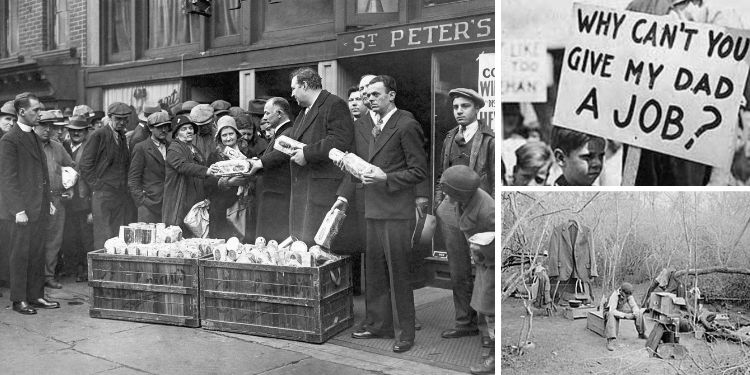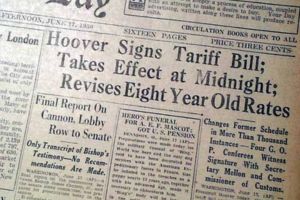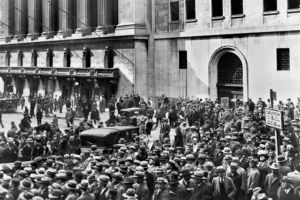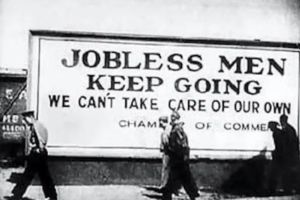Deadly Mistakes People Made During The Great Depression
 Source: https://www.askaprepper.com/
Source: https://www.askaprepper.com/
Financial gurus of all types have been predicting that the United States is heading for a financial collapse; enough of them that we have to take it seriously. While they may not agree on when it will happen or what the actual trigger will be, they agree to its inevitability.
Generally speaking, when preppers and others want to talk about the problems associated with a financial collapse, they turn to the Argentinean collapse of 1999 as their example. While that is probably the biggest such example in recent times, they often seem to forget that we have also experienced such an event, here in the United States.
It was called The Great Depression. The Argentinean collapse might be more recent, but the Great Depression happened to Americans. That means it can very easily be a much better indicator of how Americans would react to another such event.
Many people think that the Great Depression was caused by Wall Street, but it wasn’t. While the stock market crash of 1929 had a part in it, kicking it off, that alone didn’t bring the country to the point of economic depression.
With the great loss of wealth that the collapse of the stock market caused, people became more conservative in their purchases, saving money rather than spending it. But there were other problems too, which built on that.
Related: How to Keep Your Money Safe for When SHTF
 We can justly say that the ultimate cause of the Great Depression was government monetary policies. The Smoot-Hawley Tariff Act of 1930, lauded as an attempt to protect American business, was actually an attempt to increase government revenue and control, by implementing tariffs on over 20,000 imported goods.
We can justly say that the ultimate cause of the Great Depression was government monetary policies. The Smoot-Hawley Tariff Act of 1930, lauded as an attempt to protect American business, was actually an attempt to increase government revenue and control, by implementing tariffs on over 20,000 imported goods.
This caused a collapse of world trade, which also fed into creating the Depression.
Even that wasn’t the ultimate cause of the Great Depression. Ultimately what took a recession and turned it into a depression was the public losing faith in the banking system. This loss of faith was a natural result of some banks failing.
People looked at that and realized their bank could fail just as well and decided that their life’s savings were better off under their mattress, instead of in the bank.
There are some politicians who can’t keep themselves from messing with the economy, as if they understand it and think they can make it do what they want to. But the truth is that our economy is so complex, that it is unlikely that anyone fully understands it.
Even economists, who are supposed to understand it, can’t come to an agreement on the rules it operates under. So, when Congress or the sitting President start messing around with monetary policy, it’s likely that the outcome will be negative.
That leaves you and I with the need to take precautions, so that we don’t make the same mistakes our ancestors did back in the 1920s and 30s.
Another Great Depression could be right around the corner and we could be setting ourselves up to be victims of it. We need to understand the mistakes they made, so that we can at least try to avoid making the same ones.
Too Much Debt
 The first and probably biggest mistake that people made, which led up to the Great Depression was too much debt. Common people of all professions were buying into the new Stock Market, using borrowed money to do so. This sort of “leveraged buying” was fine as long as the companies that they bought stock into were making money.
The first and probably biggest mistake that people made, which led up to the Great Depression was too much debt. Common people of all professions were buying into the new Stock Market, using borrowed money to do so. This sort of “leveraged buying” was fine as long as the companies that they bought stock into were making money.
But when they lost, the people who had taken out the loans didn’t have the money to pay those loans back. This ultimately led to the collapse of many banks.
Many of those same people were overly encumbered with debt in their own lives as well, just as people were before the Great Recession of 2008/2009. When they didn’t have the money to pay for their losses in the stock market, it hurt their families as well, with people losing their homes and other things bought on credit.
Today, the average American family lives on 110% of their income, putting most family’s finances at risk, should they lose a source of income. Just as happened during the Great Depression, we can expect many people to lose their homes, cars and even furniture, if the economy turns south and they lose their jobs.
Not Having Sufficient Cash Reserves
 This mistake ties directly into the last, as the only way to protect yourself from too much debt is to have cash reserves you can use to pay the bills, should something happen to your personal finances or the economy in general.
This mistake ties directly into the last, as the only way to protect yourself from too much debt is to have cash reserves you can use to pay the bills, should something happen to your personal finances or the economy in general.
Related: Money Saving Tips From Survivors Of The Great Depression
The same people who were investing in the stock market, making leveraged purchases, were doing so without any cash reserves to protect themselves against loss.
This is largely a problem with being overly optimistic about your chances for success. That optimism can cause someone to put everything into their investments, a classic example of “all their eggs in one basket.” As long as that basket is intact, they are okay; but if anything happens to it, they are in trouble.
Living On 100% Of Their Income
The same people who were investing in the stock market, were doing the same thing that many of us do today, living the best life they could, based on the income they had. What this means is that they had no buffer between their monthly expenses and their monthly income, to take care of unexpected expenses.
When you buy a house today, the lender will generally calculate your maximum monthly payment to be equal to 28 to 30 percent of your income. This amount is considered to be the maximum most people can pay.
If they already have monthly payments, for something like a car, the amount will be reduced to reflect 28 percent of the income, after the car payment is taken out. In either case, that 28 percent means that the family is living on their entire income.
 During the Wall Street crash, many people suddenly found themselves having to make payments that they couldn’t afford, because there was no extra buffer in their monthly income.
During the Wall Street crash, many people suddenly found themselves having to make payments that they couldn’t afford, because there was no extra buffer in their monthly income.
Some of these people lost their homes. Others lost cars. Those who also lost their jobs ended up losing everything.
Buying Into The Panic
An important part of the Great Depression was the crash of the banking industry. Some banks failed, because they had lent money to people making leveraged stock purchases.
When those people defaulted on their loans, the banks were left holding that debt. In some cases, the amount of debt was enough to run the bank into bankruptcy.
Related: The Great Depression Was Nothing Compared To This
The population in general panicked, starting a run on the banks, as people withdrew their funds, putting more and more banks into financial jeopardy.
Although I’m listing this as a mistake, I’m not sure there is a solution to this problem, as that would require convincing large masses of people that their money was safe, when they could see it wasn’t. The banks which have failed recently have received a lot of attention, leading us in the direction of the same sort of thing happening again.
The only way to protect ourselves is to get our money out of the banks before a run happens; but that just might help to bring on the general panic.
Not Having Secure Deposits
When the Great Depression happened, only the largest banks were directly connected to the Federal Reserve.
 The FDIC, which we are all familiar with, was in its infancy and most deposits were not insured in any way. Small, local banks had nothing to back up their deposits, other than the loans they made with that money.
The FDIC, which we are all familiar with, was in its infancy and most deposits were not insured in any way. Small, local banks had nothing to back up their deposits, other than the loans they made with that money.
Today, deposits in many banks are insured by the FDIC.
Deposits in other banks are insured by state organizations, similar in organization and operation to the FDIC. This should mean that almost all deposits are insured, protecting the average American from losing the money they’ve deposited in the bank.
But there’s a catch to this. Deposits made into a bank that is backed by the FDIC are limited to $250,000 per deposited, per bank. If someone has $500,000 deposited in a bank and the bank fails, they won’t receive the full $500,000, but only $250,000.
The state institutions I mentioned above, which perform a similar function have limits as well, generally lower than that of the FDIC.
No Fallback Strategy
Probably the worst thing that anyone did, leading to their own demise, was to not have a fallback strategy, to be implemented in the case of a financial or other sort of disaster. In other words, they weren’t prepared to take care of themselves, should something happen to the country. They weren’t preppers.
In a way, this is somewhat amazing, as the Great Depression took place between World War I and World War II. During the First World War, the federal government was encouraging people to plant gardens and raise chickens, so that their families would have their own food.
The same happened during World War II, with the government encouraging people to plant “Victory Gardens” in their yards. Somehow, even though people were accustomed to being self-sufficient at the end of World War I, they gave that up in the 20 years between those two wars.
It would seem that after living through World War I, people would see the benefit of raising their own food and being self-sufficient. But that requires a lot of extra work; work that most people obviously didn’t want to do. They stopped raising their gardens, expecting “the system” to take care of them, much like people today.
When the next depression or financial collapse comes along, it is those who are prepared to care for themselves, rather than depending on the system, who will have the greatest chances for survival.
Anyone can join.
Anyone can contribute.
Anyone can become informed about their world.
"United We Stand" Click Here To Create Your Personal Citizen Journalist Account Today, Be Sure To Invite Your Friends.
Please Help Support BeforeitsNews by trying our Natural Health Products below!
Order by Phone at 888-809-8385 or online at https://mitocopper.com M - F 9am to 5pm EST
Order by Phone at 866-388-7003 or online at https://www.herbanomic.com M - F 9am to 5pm EST
Order by Phone at 866-388-7003 or online at https://www.herbanomics.com M - F 9am to 5pm EST
Humic & Fulvic Trace Minerals Complex - Nature's most important supplement! Vivid Dreams again!
HNEX HydroNano EXtracellular Water - Improve immune system health and reduce inflammation.
Ultimate Clinical Potency Curcumin - Natural pain relief, reduce inflammation and so much more.
MitoCopper - Bioavailable Copper destroys pathogens and gives you more energy. (See Blood Video)
Oxy Powder - Natural Colon Cleanser! Cleans out toxic buildup with oxygen!
Nascent Iodine - Promotes detoxification, mental focus and thyroid health.
Smart Meter Cover - Reduces Smart Meter radiation by 96%! (See Video).





